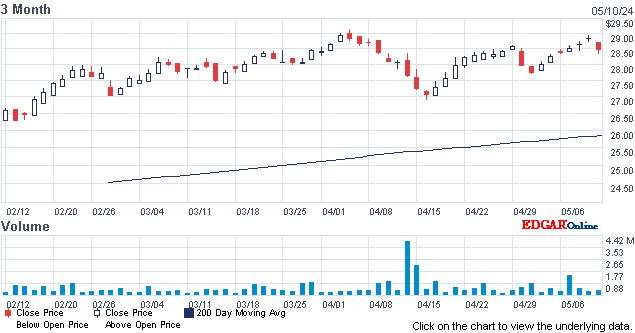Dow dropped 148, decliners over advancers 3-1 & NAZ was off 38. The MLP index fell 1+ to 433 & the REIT index lost 1+ to the 319s. Junk bond funds were mixed & Treasuries advanced. Oil rebounded on bargain hunting & gold rose a tad.
AMJ (Alerian MLP Index tracking fund)

AMJ (Alerian MLP Index tracking fund)
| CLQ15.NYM | ....Crude Oil Aug 15 | ...58.67 | (1.1%) |
| GCM15.CMX | ...Gold Jun 15 | .......1,191.40 | (0.3%) |
The US economy hit a bigger ditch in Q1 than initially estimated, held back by harsh winter weather, a strong dollar & delays at ports. GDP in the US shrank at a 0.7% annualized rate, revised from a previously reported 0.2% gain, according to the Commerce Dept. The forecast called for a 0.9% drop. By contrast, the report also showed incomes climbed, fueling the debate on whether GDP is being underestimated. A swelling trade gap subtracted the most from growth in 30 years as the appreciating dollar caused exports to slump while imports rose following the resolution of labor disputes at West Coast ports. Federal Reserve officials are among those who believe the setback in growth will be temporary, helping explain why they are considering raising interest rates this year. The economy grew at a 2.2% pace in Q4-2014. The revisions showed the trade gap widened more than previously estimated, inventories grew at a slower pace & consumer spending climbed less than previously estimated. That was partly offset by a gain in home building. While poor weather & merchandise delays due to a labor dispute at West Coast ports were temporary restraints, the damage caused by the plunge in fuel prices & stronger dollar may be longer-lasting. The income side of the economy was more upbeat, with the GDP report offering a first snapshot of the quarter’s gross domestic income. GDI adjusted for inflation climbed at a 1.4% annualized rate in Q1 after rising 3.7% in Q4. While the income & GDP should theoretically match, the different methods used in calculating the numbers cause them to sometimes diverge. Among the details of the GDP report, household consumption grew at a 1.8% annualized rate, revised down from an initial estimate of 1.9%. The forecast called for a 2% gain, following a 4.4% jump in Q4. Consumer purchasing power grew, with disposable income adjusted for inflation increasing 5.3%. The saving rate rose to 5.5% from 4.7%.
Economy in U.S. Shrank 0.7% in First Quarter
Consumer confidence in the US fell to a 6-month low in May as Americans became less sanguine about the prospects for the economy. The University of Michigan said that its final index of sentiment for the month decreased to 90.7 from 95.9 in Apr, marking the biggest decline since the end of 2012. The projection called for 89.5 after a preliminary May reading of 88.6. Household concerns that the economy is stumbling & wages will be slow to increase combined to depress spirits at the same time gradually rising gas prices took a bit more of consumers’ incomes. Continued improvement in the labor market that includes greater job security probably needs to be accompanied by pay gains to encourage more spending & propel growth. “Although the loss in confidence narrowed in late May, the decline for the month as a whole was still substantial as consumers have adopted more modest prospects for a rebound following the economy’s dismal first-quarter performance,” Richard Curtin, director of the Michigan Survey of Consumers, said. In the May report, 56% thought the economy was improving, down from 63% a month earlier & 68 percent at the start of the year. The current conditions index declined to a 7-month low of 100.8 in May from 107 in Apr. The measure of expectations 6 months from now decreased to 84.2, the weakest since Nov, from 88.8. Americans expected an inflation rate of 2.8% in the next year, up from 2.6% in Apr. Over the next 5-10 years, they expect a 2.8% rate of inflation, compared with 2.6% in the previous month. Weaker confidence helps explain why consumer spending has been slow to accelerate even after months of savings from lower gasoline costs. Retail sales barely budged in Apr & followed a 0.2% drop from Jan thru Mar that marked the first quarterly decline in almost 3 years.
Consumer Sentiment in U.S. Decreased in May
Deposit withdrawals from Greek lenders gathered pace in Apr, as a standoff between the country’s anti-austerity coalition & its creditors has renewed doubts about the country’s future in the euro area. Deposits by households & businesses fell to to €133B ($147B) in Apr from €138B in Mar, a 3.6% monthly drop, & over €100B below the Sep 2009 peak, the Bank of Greece said. The drop brings total outflows since the start of an election campaign which catapulted anti-bailout Syriza party to power, to €31B, or 19% of total deposits. Private deposits fell to their lowest level since Sep 2004, amid concerns that the quarrel between the gov & its lenders will lead to a re-denomination of savings to drachmas, or a bail in of depositors. Greek lenders have lost access to capital markets as well as the ECB regular financing operations, amid a standoff between the country’s gov & its creditors over the terms attached to the current bailout. They rely on more than €80B of Emergency Liquidity Assistance extended by the Bank of Greece to plug the hole from deposit withdrawals & stay afloat, a more expensive source of funding, while they are forced to participate in liquidity-draining auctions of government treasury bills. Total deposits in the country’s financial system fell to €142B in Apr, from €149B in Mar, as the state transfers reserves of pension funds, hospitals & regional govs from commercial bank accounts to a Bank of Greece account, for use in short-term financing operations. Internal borrowing is the sovereign’s only source of funding other than tax revenue, as the deadlock in talks with creditors has led to the suspension of bailout disbursements since last summer. Greek banks reported sustained losses in Q1, as they struggle with record outflows and a double-dip recession. Bailout talks “are progressing faster but not yet fast enough to conclude,” French Finance Minister Michel Sapin said at the G-7 meeting in Germany. “The red line is that there cannot be a deterioration of the overall budget situation, and in fact there needs to be an improvement.” Negotiations have stumbled over issues including Greek pensions. With time & patience running out, Greece hasn’t yet said how it will pay almost €1.6B in IMF payments scheduled for next month, with the first transfer due Jun 5.
Greek Bank Deposits Bleeding Worsens in April
While a major reduction in GDP for Q1 was widely expected, seeing the numbers was stunning. There will be recovery in Q2, although some factors, such as the strong dollar, persist. Consumer data is more troubling. The long recovery still is not bringing major gains in household income & the consumer is not giving lifting power to make for a stronger economy. These grim forces are not going away any time soon. Dow is back under 18K
Dow Jones Industrials














No comments:
Post a Comment